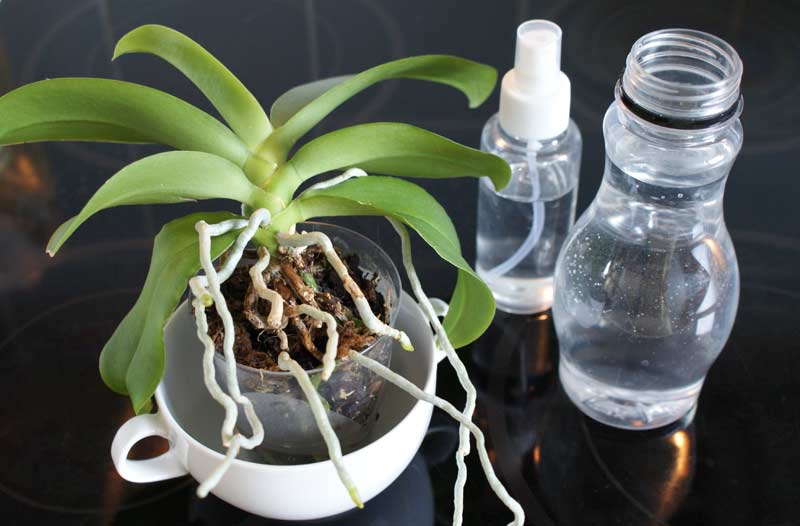
** This post is written and edited by a human being **
If you’ve noticed that the leaves of your Phalaenopsis orchid are soft, limp, or squishy, it can be a sign that something is wrong with your plant’s care. Soft leaves are often a symptom of stress or an underlying issue, and understanding the cause can help you restore your orchid to health. Let’s go over some common reasons why Phalaenopsis orchid leaves might become soft.
1. Overwatering
One of the most common causes of soft, limp orchid leaves is overwatering. When you water your Phalaenopsis too often or if the potting medium doesn’t drain well, the roots can become waterlogged. This prevents the roots from absorbing enough oxygen, leading to root rot. As a result, the plant is unable to take up enough water, and the leaves begin to soften and lose their rigidity.
Solution: If overwatering is the issue, check the roots. Healthy orchid roots should be firm and white or light green, while rotting roots will be mushy and brown or black. Trim any rotting roots, repot the orchid in fresh, well-draining medium, and adjust your watering routine to allow the roots to dry out slightly between waterings.
2. Underwatering
On the flip side, underwatering can also cause Phalaenopsis orchid leaves to become soft. When the plant doesn’t get enough water, it can’t hydrate the leaves properly, leading them to become limp and shriveled.
Solution: Water your orchid thoroughly when the potting mix feels dry to the touch. Make sure the water drains out of the pot, and never let the orchid sit in standing water. Also, ensure that your orchid is in a humidity-friendly environment.
3. Low Humidity
Phalaenopsis orchids are native to humid environments, and if the air around the plant is too dry, the leaves can lose their turgidity and become soft. This is especially common in homes with dry air or during the winter months when the indoor air is less humid.
Solution: Increase humidity around the orchid by placing it on a humidity tray, using a room humidifier, or misting the leaves occasionally (but avoid getting water in the crown to prevent rot).
By monitoring your watering habits and humidity levels, and ensuring the orchid has proper drainage, you can help restore your Phalaenopsis orchid’s leaves to their healthy, firm state.
Why Are My Orchids Wilting
If your Phalaenopsis orchid’s flowers or leaves are wilting, it can be a sign that something is off with its care. Wilting is often an indication that the plant is stressed, and it can happen for a variety of reasons. Understanding the cause of the wilting will help you address the issue and bring your orchid back to health.
1. Overwatering or Root Rot
One of the most common causes of wilting in Phalaenopsis orchids is overwatering. When the orchid’s roots sit in too much water, they can rot. This prevents the plant from absorbing the nutrients and water it needs, causing the leaves and flowers to wilt and droop. Overwatering can also lead to other issues like fungal infections, which further stress the plant.
Solution: If overwatering is the issue, check the roots. Healthy roots should be firm and light-colored, while rotting roots will be mushy and dark. Trim any damaged roots and repot the orchid in fresh, well-draining medium. Be sure to adjust your watering schedule, allowing the potting mix to dry out slightly between waterings.
2. Underwatering
On the other hand, underwatering can also cause wilting in orchids. If the plant isn’t receiving enough water, the leaves will droop as the orchid struggles to hydrate itself. Phalaenopsis orchids prefer their potting mix to dry out a bit between waterings, but if they go too long without water, the plant will show signs of dehydration.
Solution: Ensure you’re watering your orchid thoroughly when the potting mix feels dry to the touch. Make sure the water drains out of the pot completely and that the orchid isn’t left sitting in water.
3. Low Humidity
Phalaenopsis orchids thrive in high humidity. If the air in your home is too dry, particularly in winter when indoor air tends to be drier, the orchid can become stressed, causing the leaves to wilt.
Solution: Increase humidity by placing the orchid on a humidity tray, using a humidifier, or misting the leaves regularly, but avoid wetting the crown.
By addressing these common issues—watering habits, humidity levels, and proper drainage—you can help your Phalaenopsis orchid recover from wilting and return to health.
TIP: Read Irene’s guide: How to Look After your Orchid House Plant.



